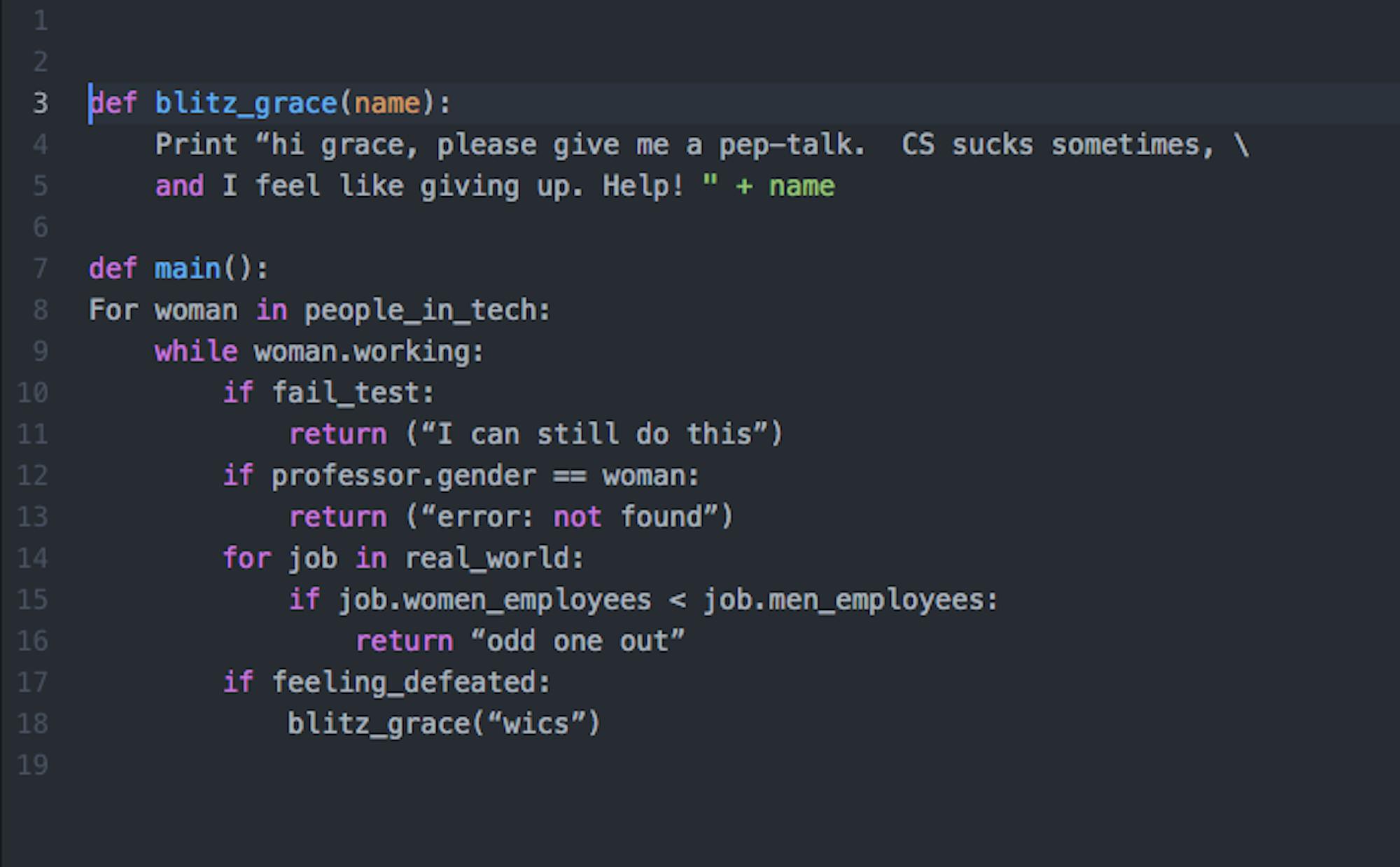A unicorn in the tech world is defined as a start-up company that is currently valued at over $1 billion. Unicorns are named as such because they are extremely rare. Here’s a number even more rare: 50 percent. On average, women make up about 15.6 percent of technical employees. That is a pretty insane statistic, and one that I hope to change.
I took my first computer science course my freshman spring. I honestly had no idea what computer science was. I assumed it was full of complicated math equations and words so big they scared me. This is actually quite ironic because coding literally can be broken down into bits — a unit of data that says “yes” or “no.” That’s it. That is what drives every piece of technology you have ever owned (unless you own a quantum computer).
This is all to say that I started the computer science major late — while other people had been coding since middle school, I printed my first “hello world” three years ago. I am no coding prodigy, “Computer Science 1” wasn’t the easiest class I’ve ever taken. I would say my relationship with computer science is like an addiction. Every assignment tears me down, but the high I get when it compiles and I watch my Google search engine, or animation or chess AI work, that is a high like no other.
Here’s the thing about computer science: it’s all or nothing. Either your code runs and everything works, or everything breaks and you get a 0 on that assignment. Classes are large, and most professors are unforgiving (if they respond to your emails at all). I have pulled all-nighters just to fail tests (yes, as in got a 63) and had to ask a professor if I could still pass a class with my current grades (I could, god bless a curve). During one TA hour I nearly started a student revolt by riling up my classmates about how insane the grading scale was. This is where being a woman comes in.
From my experience, women have an innate need to succeed; they internalize failure as their fault. In a CS1 class the breakdown of students is about 50/50 by gender. Yet, by upper-level courses I have been one of four women in a 40-person class. Many women get discouraged by failure. They see that they bombed a test and they think “well, I guess this isn’t my thing, I’m just not good enough.” I know, because I feel this way regularly. I have met some of the strongest women I know in computer science, the type that take failure in stride and are here to learn. This strong support network is how I’ve survived.
Out of the seven women that I live with, four of us are pursuing software engineering. This is no coincidence. These women are who have pushed me through the tough times. Computer science is a team sport. You need people around you to help when you are stuck on a bad bug, to talk through a confusing algorithm, to band together with you during late hours in Novack and to complain to about your insane workload. My friend Pritika sends me pump up music before coding interviews or will randomly text me “beep boop beep” sometimes at 3 a.m. My friend Wanda and I share screenshots of our parents’ motivational texts, riddled with “you ARE very smart” and “I love you and this will pass.” Spending 12 hours a day in the library isn’t so bad when you have friends around.
I have many guy friends in computer science as well, it’s impossible not to, but it can be hard to be in a group with all men. I don’t want to become the stereotype they are all expecting, the dumb weak girl who is constantly asking for help, and cries when her code doesn’t run. I ask for less help, try not to take too much of their time and feel needy constantly. I think a question on many peoples’ minds, including mine, is “why do we need female coders? If the code works, who cares if it was built by a woman?” The answer is that there is so much more to coding than the end product. My female friends have created a community full of empathy, where it is OK to show weakness, to ask for help and to break down occasionally. Coding is stressful enough, I don’t want to work somewhere that I can’t feel vulnerable, where I feel like every mistake I make speaks for my entire gender.
Last year, I got so frustrated by how unfair a test was that I nearly started crying during it. The professor had said it would take two hours — no one had finished three and a half hours in, and I left five hours later at 11 p.m. on the Thursday of Winter Carnival. My voice cracked while asking him a question — he had given us code with functions we had never used before. A week later I went to talk to him about a group project (my two male group partners couldn’t make it). He closed the door, sat me down and proceeded to lecture me with 30 minutes of unsolicited advice about how I didn’t think enough when I coded, how I was illogical.
“Are you a major?” he asked.
“Yes.” (No, I’m just in this upper-level course for fun, duh).
“Oh…”
This man had probably never looked at my code (TAs grade everything), and I was getting good grades in his class, but he was using my code as a thinly-veiled way to scold me for being too emotional. I left that meeting wanting to drop the major, feeling like I would never be good enough. Luckily I ran into a female ’16 CS major who was furious that a professor would talk to me so negatively: “He never would have done that to a guy.”
I understand that change takes time, we aren’t suddenly going to hit a 50/50 mark for women in tech tomorrow, but we can take steps to reach it right now. My mom (a true badass at her job) often tells me, “don’t come to me with a problem, come to me with a solution.” My solution starts early. Build the confidence in little girls that they can do anything. Stop telling girls that they are “bossy,” “naggy” or “shrill.”
Don’t let your female friends follow up an intelligent statement with “oh, but maybe I’m wrong, I don’t know.” Don’t let women call themselves “psycho bitches” when they demand quality work from their peers. I urge my peers to take computer science courses, and come to me with questions and for support whenever they feel discouraged. Blitz me if you want a fellow WICS support, or find me in Novack between the hours of 1 p.m.- 3 a.m.




